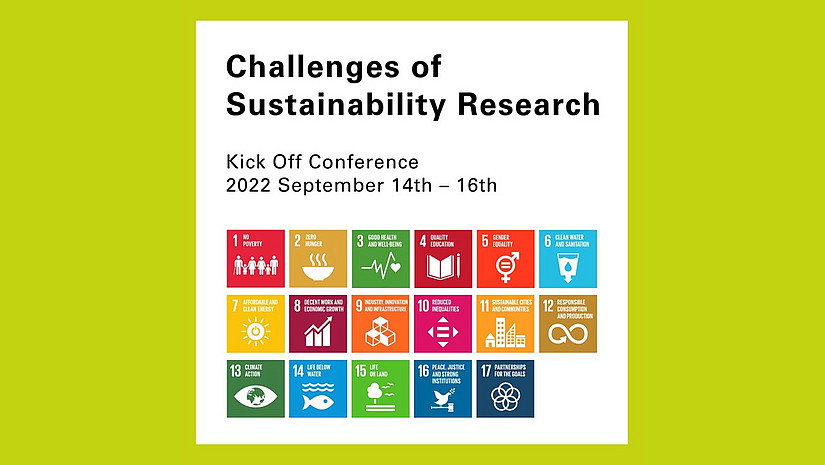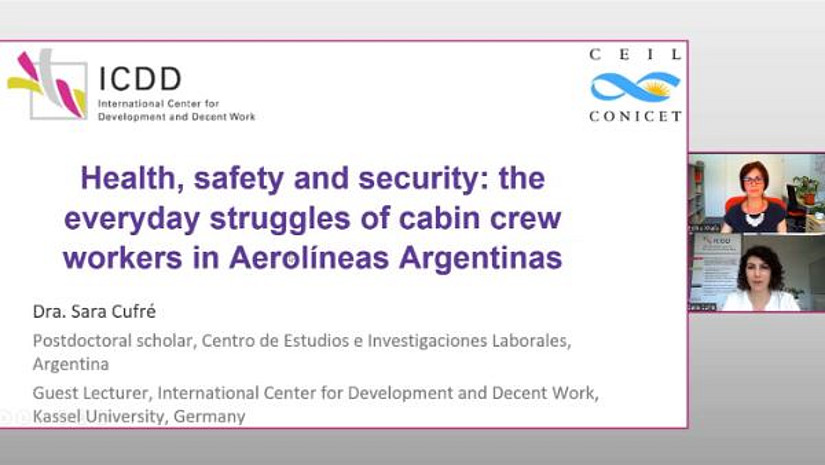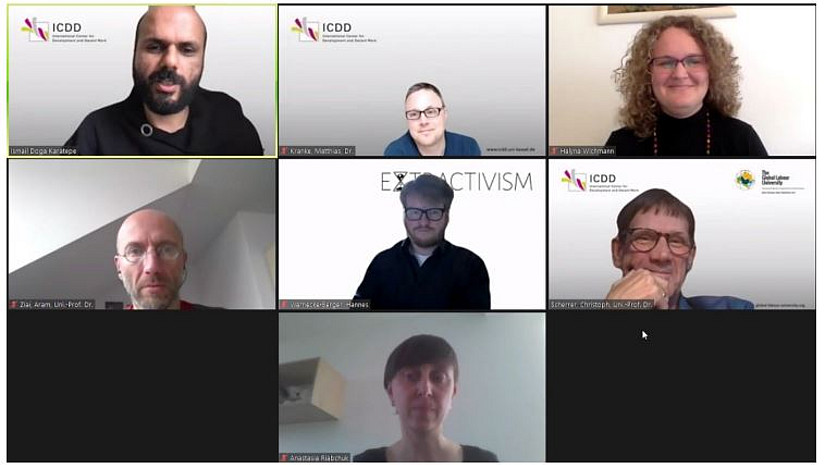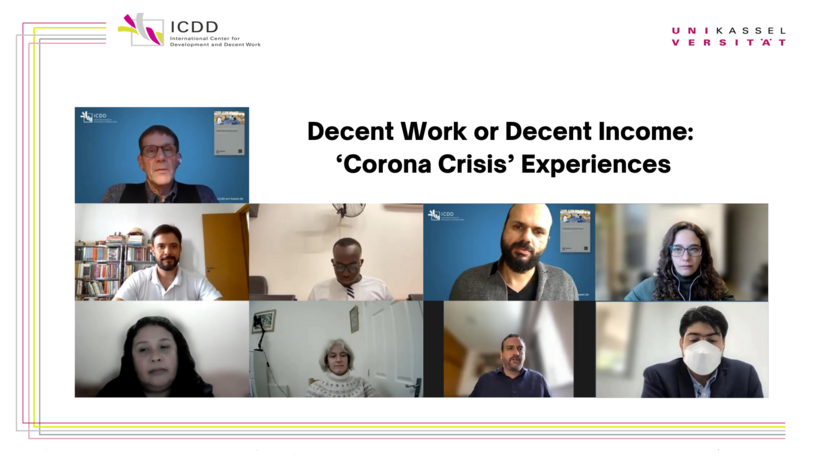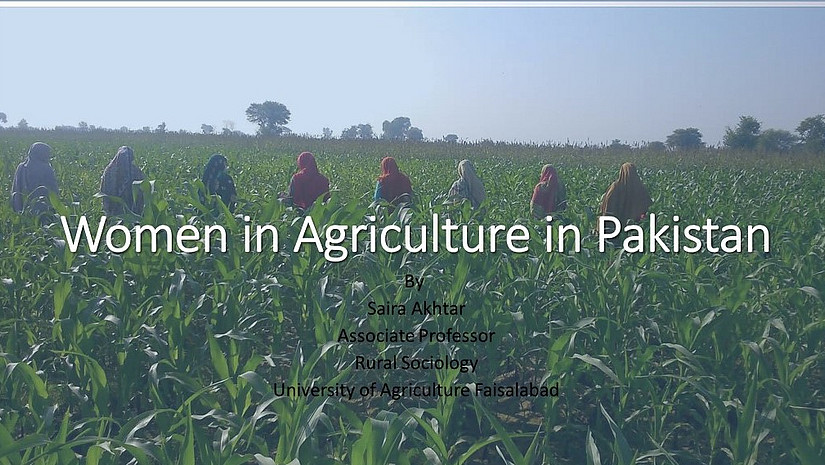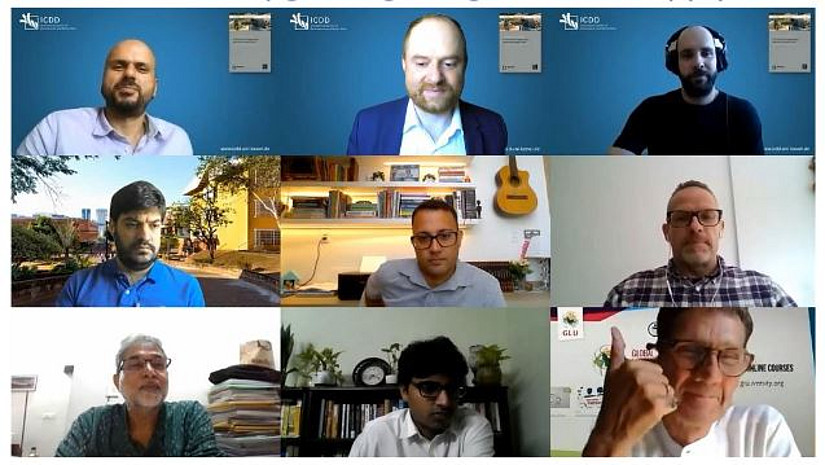Event Write-up
Panel 1: The Role of Labour in Processes of Social-Ecological Transformation
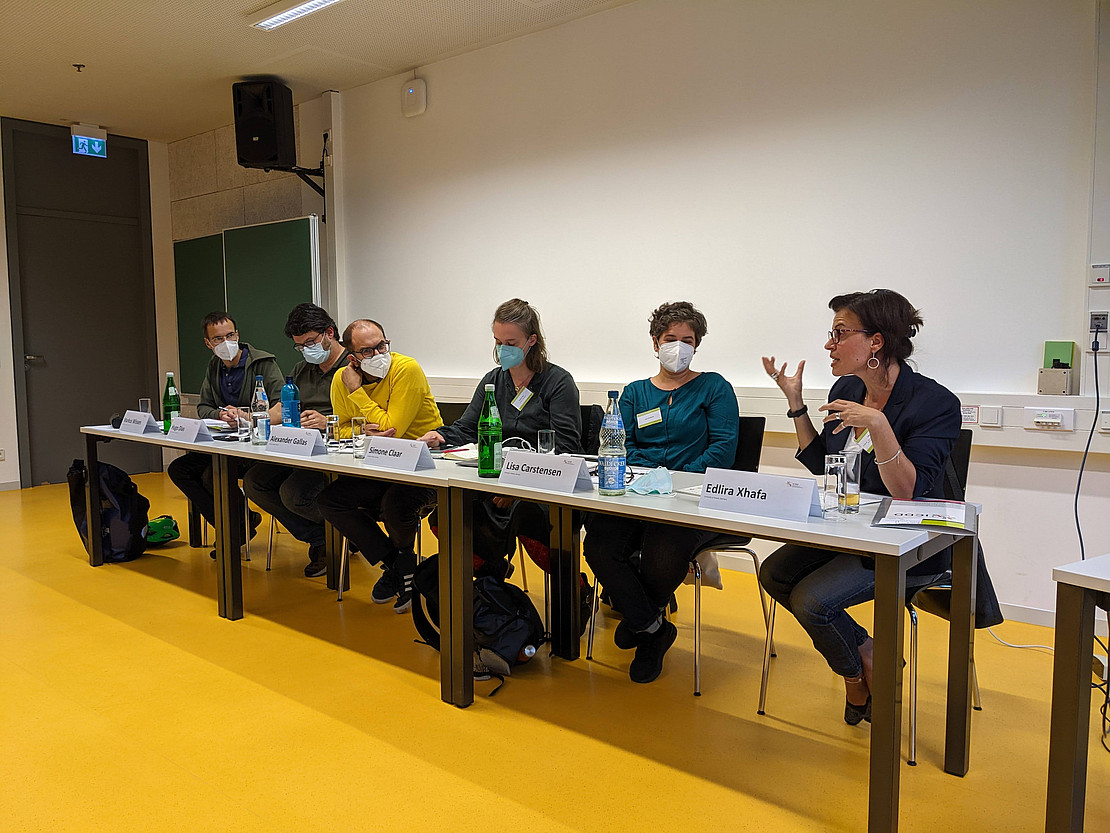
The panel discussed whether 'just transition' or 'socio-ecological transformation' is viable, how they can be implemented, and what challenges unions and political decision-makers are facing in the process.
Panel 2: Commons, Gender and Care
The panel discussed how commons can be the basis of an anti-capitalist feminist program, what ambiguities and differences emerge in the practical interpretation of commons, and how femist and capitalist-critical perspectives are brought together.
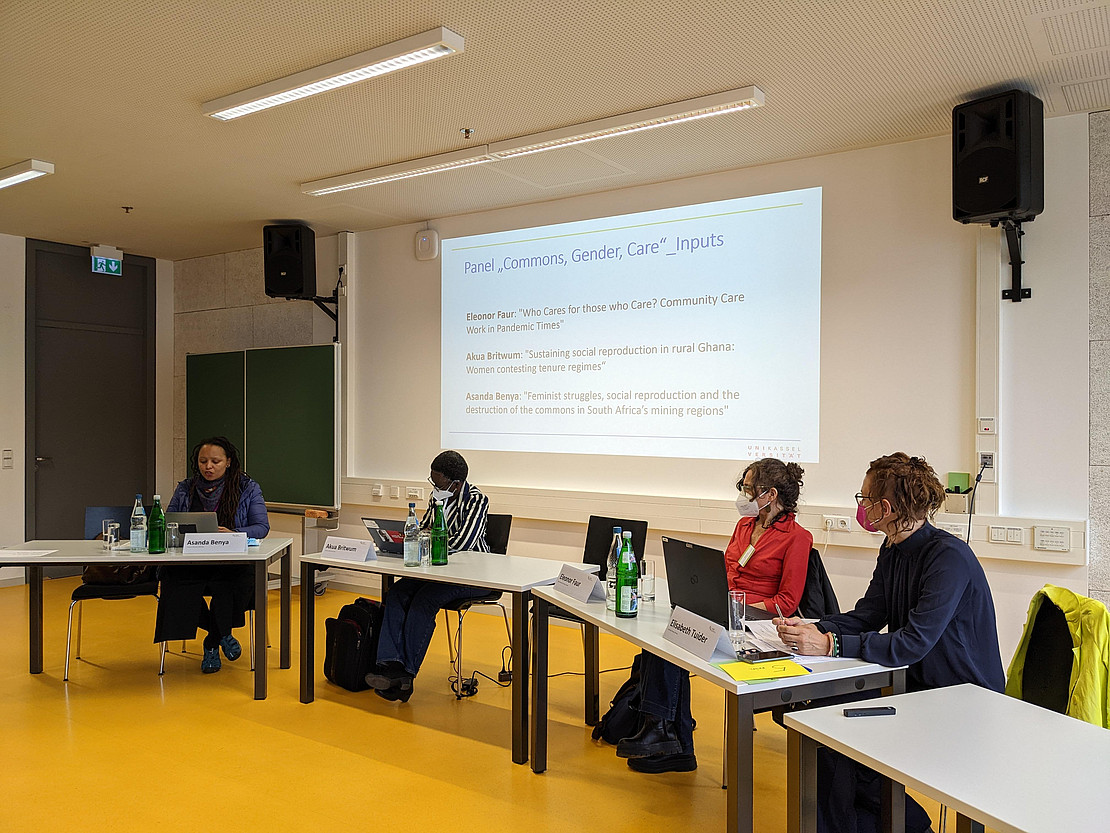
Panel 3: Economic Policies for a Just Transition
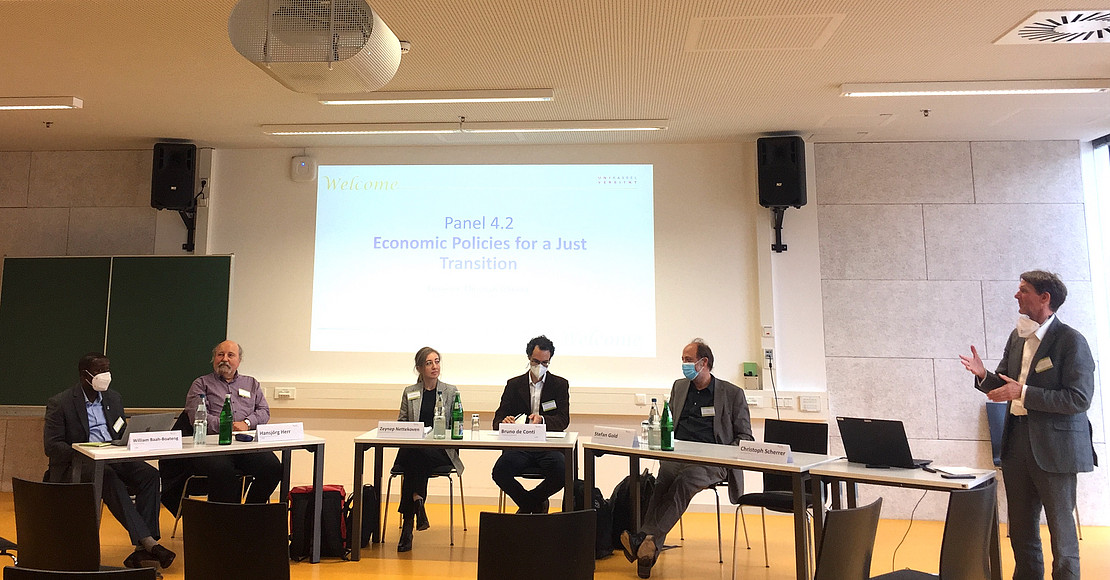
The panel discussed what kind of industrial policy is needed for a just transition, the extent to which global economic policy needs to change to enable sustainable industrial policy, how to improve the implementation of such policy, and the role of unions in overcoming domestic resistance.
03 June 2022 – The ICDD hosted the Public Talk: “Health, safety and security: the everyday struggles of cabin crew workers in Aerolíneas Argentinas”. The speaker, Dr. Sara Cufré, addressed the current crisis in aviation, marked by Covid-19 containment policies and accelerated flexibilisation, exploitation and overall precarity in the sector. Her lecture also explored workers' individual and collective organising and resistance to these detrimental trends.
Aviation Industry Models and Trends
Cufré stressed that the focus of her lecture is on how the cabin crew members resisted the process of intensified exploitation of their labouring bodies in the first period of the company’s re-nationalisation between 2008 and 2015. The company initially tried to modify collective bargaining agreements and increase the workload, which caused open conflict with cabin crew workers.
Furthermore, Cufré outlined the broader trends in the aviation industry since the inception of low- cost companies, in the 1990s. Two industry models emerged: low-cost carriers (LCC) and full-service carriers (FSC). LCCs such as Ryanair are characterised by precarious working conditions and flexible working hours, while FSCs such as Aerolíneas Argentinas offer stable, well-paying jobs and have strong union traditions. However, “flexiblisation and undermining of decent working conditions are part of global tendencies in air transport, and Aerolíneas Argentinas is no exception”, noted Cufré.
Company History – Re-nationalisation
The speaker provided a brief summary of company history, underlining that it follows a typical trajectory for public companies in Argentina, including privatisation in the 1900s and subsequent re- nationalisation. In 2015, the new federal government intervened by implementing a new company management structure and a set of aviation policies. These policies deregulated the domestic market and introduced new federal corridors in 2014. With more take-offs and landings required from workers, these policies increased the workload further and shortened the breaks.
Daily Struggles of Workers and their Labouring Bodies
Daily struggles of workers, that is their knowledge, practices, and concrete actions are another key layer of studying the topic. Cufré explained that these struggles are not driven by union officials, but by union tradition, and that “capacity to work is inseparable from the concrete corporal bodies and therefore not a commodity that is capitalist-produced”. Social reproduction theory is crucial, as it adds emotional and mental elements to the understanding of labour power in capitalist systems.
Furthermore, “labour power is not an abstract, but a socially mediated aggregate of corporeal capacities embedded in labouring bodies with their particularities, bodies that are socially and historically produced”, Cufré remarked. In this context, constant tiredness, headaches and other complex experiences cannot be viewed simply as work-related diseases because as such, they remain disregarded by mainstream occupational health perspectives.
“I view the relationship between worker-led actions, union tradition, and resistance practices through the body lens, as a totality captured by social reproduction theory, not as a narrow Occupational Safety and Health definition”, Cufré asserted.
Intensifying Workload and Resistance Strategies
During the period of open conflict in 2012, the company found new ways of intensifying the workload. Cabin crew members responded by employing two strategies: “Not flying expired” and “not performing as cabin crew chief”.
The first strategy involves actions such as not getting on the plane, and it requires knowledge of aeronautical legislation, collective bargaining, and co-workers’ and colleagues’ support. The second strategy includes actions such as rejecting multitasking and it hinges on the ability to distinguish between professional qualification and de-facto multitasking. Cufré warned that refusal to work is difficult for workers, even more so for female cabin crew members, who tend to be subordinated to male, military-trained pilots.
Organising and the Role of Union Tradition
Union tradition plays a vital role in overcoming these obstacles, as well as other everyday struggles of workers. Tradition takes the form of union delegates ́ support, collective agreements knowledge and references to past struggles. In the case of Argentinian airlines during re-nationalisation, this tradition has led to greater resistance to company guidelines associated with productivity and effectiveness. Airline companies ́ attempts to reinterpret collective agreements were met by more robust workers ́ organising.
Organising of cabin crew workers, based on knowledge of labour rights, also disputed working hours and tasks, making strong claims about the meaning of a re-nationalised company. On the other hand, efforts to protect workers against fatigue framed the cabin crew’s own safety in the context of the safety of the flight. This is where union tradition comes into play again. “Without flight safety, no airline sells tickets”, stated Cufré, adding that “safety can be warranted only if labour rights are warranted”.
About Sara Cufré
Sara Cufré is a researcher in the field of Labour Sociology and a union activist. She is a Postdoctoral Fellow of the National Scientific and Technical Research Council in Argentina and she conducts herresearch at the Center for Labour Studies and Research (CEIL). She also teaches Social Science Methodology at Del Salvador University (USAL).
She has combined her academic trajectory with a strong involvement in the workers' movement as a shop steward in one of the public sector unions in Argentina: the Asociación de Trabajadores del Estado (ATE). She also participates actively in the Global Labour University (GLU) network and since 2021 she is a certified online tutor for the Massive Open Online Courses (MOOCs) at the GLU Online Academy.
Related Links
14 April 2022 – The ICDD organised the Public Talk “War in Ukraine - Impact on People - Impact on Theory”. The event addressed the two main questions: “What is the impact on People?” and “Do we need to revise our theories of international relations/ international political economy?” Accounts of the current humanitarian crisis were provided alongside consideration related to potential revisions of mainstream theoretical approaches.
Humanitarian Accounts: Victims and Heroes of the War
Anastasia Ryabchuk, Associate Professor in Sociology at the National University of Kyiv-Mohyla Academy, who currently is a refugee in Paris, opened by remarking that the Ukrainian War is a “dramatic humanitarian situation” and that it has been ongoing since 2014 but was until 2022 more limited to regions of Donetsk and Lugansk. “I do not understand why we call this “War in Ukraine” or “Ukrainian War”. This suggests that the conflict is between Ukrainian people and that is not the case. The agent of this humanitarian disaster must be named: This is a Russian War in Ukraine, a Russian invasion”.
Ryabchuk then focused on detailing who the most vulnerable groups affected by the conflict are, stating that more than 3 million people have crossed the border of the EU, while 6.5 million have been internally displaced and around 50% of families remain separated. The majority of them are women and children and elderly people, while many civilians still continue to be trapped in occupied territory and regions in which there is fighting, and to make the situation worse, they lack essential resource such as food, medicine, and drinking water.
She highlighted the heroes of this conflict as well- frontline workers, journalists, volunteers, and transportation workers, particularly those in the railway sector. She observed that the society “has mobilized from the bottom up, showing that there is a vibrant civil sector in Ukraine”. The level of trust in state institutions is rising and “the role of state is important and should not beunderestimated. The situation is much worse in areas where the state is weak “, Ryabchuk concluded.
Refuge Crisis and Response of EU/Germany
Halyna Wichmann, an ICDD PhD Alumna that is currently working at the Federal Employment Agency of Germany to support Ukrainian refugees, emphasised that the number of refugees is even higher than reported by the media, estimating it at 4.6 million people. She described the demographic profile of those seeking refuge in Germany: “Most of the refugees are women coming with their children. There are also kids who come alone or with other families”. The majority of refugees prefer big cities, where they may be able to find a job later and many live in asylum-type collective accommodation. Wichmann outlined their most essentials needs, which include financial, psychological, medical, and administrative aid, as well as transport, translation, and accommodation.
Furthermore, she explained how the EU is legally treating refugees. The European Council recognised the mass influx of displaced people and “activated Temporary Protection Directive, which was translated to national legislations”. This change indicates that in countries like Germany, the legal treatment differs from the situation in 2015, when the refugees were recognised as asylum seekers. As a result, they now have right to employment and access to social benefits and healthcare and can apply for language courses. The biggest challenge in Germany, however “is to accommodate children into the school system. Schools have to organize teachers and in bigger cities they even invite Ukrainian teachers to teach."
Wichmann concluded that it is necessary to revise international relations theories due to lack of research on Eastern Europe and Ukraine in particular, and the fact that if and when the country is analysed, this is done from a Russian-centered standpoint. “Ukraine is not viewed as a subject, but object of history and international relations”, and what is lacking is the analysis of the post-colonial dimension of the post-Soviet sphere, she added.
The Social and Ecological Catastrophe
Matthias Kranke stressed the necessity for revising mainstream theories, not just because of the Russian war in Ukraine, but also multiplying social and ecological catastrophes that humanity faces right now. He argued that the theoretical debates and practical accounts of what is happening on the ground should go hand in hand.
Kranke also asserted that political realism explains just one part of the story, failing to explain “how the enemy is constructed and how Putin in particular has portrayed Ukrainian politicians, because to enable war you first have to construct a threat that is immediate for your polity”.
He pointed out to one of the overlooked aspects of the conflict in theoretical debates, which is the ecological disaster, the destruction of an already stressed ecosystem. “Homicide and ecocide in Ukraine are intertwined. We have to think what the long-term effects of this sustained human suffering and ecosystem damage, even when the war is over, as we see some cities like Mariupol being erased.”
In addition, the destruction of agricultural infrastructure creates hunger in the country and elsewhere, especially in countries that are dependent on imports such as wheat. Lastly, one should also not overlook negative energy sector implications of the conflict. Germany decided to address energy security issues, possibly going for a stronger shift toward renewables, or return to nuclear or fracking and other problematic sources of energy. This could fuel global warming, warned Kranke.
Lockean Heartland and Contender States; NATO and Russia
Christoph Scherrer investigated the role of the Kees van der Pijl ́s Lockean Heartland Theory and the concept of Hobbesian Contender States. He underlined that heartland involves advanced capitalistsocieties, but that “they are not necessarily peace-loving countries. Otherwise, they would not be so strong”. In fact, they have stablished hegemony over large parts of the globe and as dominant forces, they can be more liberal internally than externally. The other group, Hobbesian contender states, are those who want to catch up to the first group economically, militarily, and technologically. “They cannot do so without collective action and strong state, and they tend to be authoritarian and follow more of a territorial logic".
If they are successful in this pursuit, it gives rise to a military-industrial complex under authoritarian rule, which externalises societal conflicts. If we apply that to Russia, Scherrer said, it is clear that after USSR disintegration, Putin has aimed to build a powerful state that would reclaim its status as a world power. The base of their power currently is to a large extent extractivism, and Russia as a contender state, continues to attempt to extend its territory, which drives conflict.
“Every more liberal state nearby is seen as a threat by Russia. If any big neighbour like Ukraine turns to liberal capitalist democracy, this is seen as a major threat, much more so than NATO, because from a strategic standpoint, intercontinental missiles don’t need buffer states. Why does a country with the biggest land mass and nuclear arsenal in the world need buffer states?” concluded Scherrer.
Relinking Political and Economic Theory
Hannes Warnecke-Berger stated that the war on Ukraine is the “current end of the structural shift in the world system and economy”. Since the Financial Crisis of 2008, there have been different conflicts and crises such as the war in Syria. “Core capitalist states turn out to be too weak to guarantee peace and stability to the entire system”, and this is quite similar to the situation in 1914, at the eve of the First World War.
Warnecke-Berger remarked that the key question is how the economic system interacts with the political one, and what position countries occupy in the global division of labour. According to him, there are five groups of countries: core capitalist countries, catching-up countries looking to escape middle-income trap (China and India), raw material export countries, labour-exporting countries, and those who are stuck in between these categories. “I think we never tackled this international division of labour and that is the problem”, he noticed.
The two prevailing theoretical approaches, European constructivism and some branches of institutionalism, prove to be ill-equipped to explain the crisis tendencies within the world system and also to relate economic and political systems, including the division of power within them. In Germany, the elite realised that coexistence within the system is possible but predicated on the balance of power between nuclear states. “It is important to also realise that this balance is dependent of economic power and how states are able to change their position in the world economy”, said Warnecke-Berger. Finally, he highlighted that one other crucial point of future theory development is tied to the ability of the system to guarantee peace and stability on the international level, as well as to boost the capacity for domestic social forces to change the society. Over these two points, both constructivism and institutionalism went bankrupt, he concluded.
Critical and Post-Colonial Perspectives
Aram Ziai affirmed that there are multiple ways to respond to the crisis and that Germany has responded by massively building up military resources, which is worrisome. To the question of whether we should change theoretical approaches, he responded with “if we are talking about critical theories that we teach here at the University of Kassel, I do not see why we should”. On the other hand, a significant part of the peace movement has turned a blind eye to what Russia has been doing, he cautioned, as they “remain stuck in anti-American and anti-imperial outlooks, failing to see there are other forms of imperialism”.
In the context of the post-colonial theory, he observed that “there have been scholars using post- colonial perspective on Eastern Europe and Soviet Union, but they have been rarely in the centre of attention and were largely marginalised”. It is worth noting that Soviet imperialism differs significantly from what European colonisers have done to other states, including slave trade, racism, and genocide.
“The danger I see now is return of realism and power politics. I would not subscribe to the idea that other approaches are somewhat bankrupt because war in Ukraine proves the validity of realpolitik.” The main reason he specified is that according to realpolitik, war and conflict are inevitable between states. But, from a critical standpoint, this is only how particular states act in some situations, depending on power relations, and construction of identity, as well as perceptions of external and internal threats. This is why realist perspective “does not apply to all states. Conflict is not inevitable, and we need to point to alternatives, and that is being lost at the moment.”
Critical theories are vital because they examine class interest and intersectionalities, and not national interest, rejecting hegemonism as a primary focal point. “And if we break this black box of the state, we find not only different classes, but also genders...and the rise of nationalism and militarism has gone hand in hand with the rise of domestic violence.” Inequalities are to be found within these states and these inequalities determine the level of exclusion one experiences, concluded Ziai.
Related Links
26 January 2022 – The International Center for Development and Decent Work (ICDD) launched its latest book in a special webinar, featuring nine researchers from Brazil, Germany, Ghana, Mexico, the Philippines, the UK and the USA.
“Decent Work or Decent Income: ‘Corona Crisis’ Experiences” is the 24th volume in the Labor and Globalization book series. This book, edited by Prof. Dr. Lygia Sabbag Fares and Prof. Dr. Pedro Henrique Evangelista Duarte, analyzes the impact of the pandemic on the world of work, taking into account gender and racial issues, and identifies strategies for addressing labour and economic challenges in different countries. It includes ten studies on single countries and two cross-country analyses.
A collaborative project to capture the impact of the COVID-19 pandemic on the world of work
Dr. Lygia Sabbag Fares, a core faculty member at Brooklyn Institute for Social Research, and co-editor of the book, shared that the idea for the book came about during the Global Labour University Workshop 2019 in Witzenhausen. She explained that “as editors, we really wanted to capture the impact of the COVID-19 pandemic on the world of work around the world, including different sectors of the economy, and intersectionalities such as gender and race”.
Prof. Fares highlighted that the pandemic occurred at a time when neoliberal ideas were still considered the main ideological framework for setting macroeconomic policies around the world. In terms of labor relations, the main goal of neoliberalism was to dismantle labour protections, seeing them only as a productive cost. This pandemic leads to growing inequality, poverty, unemployment and income loss.
Against this backdrop, this book aims to bring together valuable contributions from academics, researchers, and labour movement activists from all regions of the world to discuss and examine the consequences of the pandemic on the ground.
Poverty and Vulnerability of Agricultural Work in Southern Yucatan through COVID-19
Prof. Dr. Francisco Iván Hernández, Professor at the Marist University of Mérida, stressed that the pandemic prompted many workers in the secondary and tertiary sectors to return to carrying out agricultural activities. In this sense, subsistence agriculture served as “unemployment insurance”. Although the decent work deficits in agriculture are evident, households engaged in agricultural activities have an 18 USD higher monthly per capita income compared to households not engaged in agricultural activities. Practising subsistence agriculture also reduces the likelihood of falling into food poverty by 14%.
Voices from Street Vendors in Accra, Ghana
John Oti Amoah, Research Fellow at the Centre for Gender Research, Advocacy and Documentation, University of Cape Coast (UCC), and Lecturer at the Centre for African and International Studies (UCC), emphasized that the three-week partial lockdown in Ghana in 2020 hit informal workers, especially street vendors, very hard. Low market demand and loss of working capital have been the most common impacts of COVID-19 on the livelihoods of street vendors. Moreover, the pandemic disproportionately affects women’s productive and reproductive lives, compared to men. The pandemic also affects women more, as men tend to trade with non-perishable goods, while women tend to trade more perishable goods.
Amoah also pointed out that the government response has been very limited and street vendors have been excluded from the government stimulus package for micro, small and medium enterprises. It is essential to transform the distributive schemes, underscoring gender focal points that engage women and vulnerable informal workers.
Labour, Gender and Work in the Regions of India during the COVID-19 Period
Prof. Dr. Wendy Olsen, Head of the Department of Social Statistics at Manchester University, analyzed women's disadvantage in the labour market and, in particular, how the COVID-19 pandemic disproportionately affected women's work in India. The migration of family members increased women’s workforce participation, especially in the informal sector. The pandemic has resulted in significant job losses, forcing many temporary migrants to return to their original villages and towns. Unpaid work rose for women, while paid work decreased.
Prof. Dr. Olsen also pointed out the different spread of the disease in different districts of India. She emphasized that increasing contagion is directly linked to physical movement and circular emigration at different spatial scales.
The Repercussions of Dismantling Brazil’s Social Protection System in the Fight against COVID-19
Prof. Dr. Paulo Malerba, professor and union activist in the banking sector in Brazil, stressed that neoliberal policies and the corresponding labour reform have weakened the welfare state. These policies contributed to increasing the social vulnerability of the population and weakening the state apparatus. Specifically, there was a weakening of the public health system and a decline in formal jobs. Many Brazilians had no guarantee of income, and therefore need to expose themselves to the virus. This situation has been further worsened by the emergence of the new coronavirus.
Gendered Dimensions of the COVID-19 Pandemic: Cross-country Analysis
Verna Dinah Viajar, Postdoctoral Research Fellow of the Rosa-Luxemburg-Stiftung under the Global Scholarly Dialogue Program, stated that the pandemic in the Philippines, Indonesia and Uganda poses challenges and highlights weaknesses in the health sectors, as the sectors have undergone privatization and employment flexibilization. Due to the pandemic, the workload of health workers has increased and there has been a lack of protective equipment for workers. Women have been disproportionately affected.
Viajar also stressed that some governments responded with authoritarian (in the Philippines and Indonesia) and anti-democratic measures (in Uganda), which reinforced inequality, exploitation and violence against women. Because of their vital role in sustaining life amidst the pandemic, women need to be at the centre of the recovery effort, she emphasized.
The important role of governments and social organizations in promoting decent work and decent income
Lastly, Prof. Dr. Pedro Henrique Evangelista Duarte, Professor at the Federal University of Goiás, concluded that countries faced similar challenges due to the Covid-19 pandemic. However, their different social, political and economic structures and level of resources put them in very different positions to respond to these challenges. “I hope this book will be useful for trade unions, political actors and scholars to address some of the challenges we face due to the COVID-19 pandemic. Governments and social organizations are the key actors to promote decent work and decent income”, stated Prof. Dr. Duarte.
Related Links
17 November 2021 – The International Center for Development and Decent Work (ICDD) hosted a public talk, featuring Dr. Saira Akhtar, a rural sociologist with many years of experience in development work and research with international and national organizations. She is currently working as an Associate Professor at the University of Agriculture Faisalabad, Pakistan.
The role of women in agriculture in Pakistan
Pakistan is an agrarian country, and agriculture is the basic pillar of the country’s economy. Dr. Akhtar emphasized that women play a very important role in this crucial sector, in terms of both labor force participation and the tasks they perform. It is estimated that 67 percent of Pakistani women work in this sector and women generate 66 percent of the GDP in agriculture.
Dr. Akhtar presented that women are involved in various activities related to subsistence farming and livestock. They are involved in many tasks, such as backyard poultry (e.g. egg selection, hatching arrangements), forest work (e.g. gathering fuel wood, medical plants) and fishery (e.g. fish salting and drying, fishing net making). In general, there are three types of work that women have to do: paid, unpaid, and care work.
Challenges faced by women in agriculture
Despite their important contribution, women suffer from a decent work deficit, emphasized Dr. Akhtar. They have longer working hours and discriminated wages, as wages differ based on gender. Women are deprived of owning land and productive resources. They also have limited participation in decision-making, and there are no legal protections or provisions for labor rights in the agricultural sector. They are less informed and not aware about their rights. Dr. Akhtar also explained that there is still a perception that “women are not farmers”, which excludes women from agricultural research and related activities. Due to social taboos and patriarchal dominance, their work evokes much resistance in the community.
Policy and sustainability
Dr. Akhtar shared that the government has been reluctant to recognize the role and contribution of women in the economy. Recently, however, Pakistan took an important step toward ending abuse and discrimination against women agricultural workers. In particular, the Sindh cabinet approved the Sindh Women Agriculture Workers Act 2019 and the Resolution to Punjab Government demanding equal wages for female agricultural workers.
Dr. Akhtar emphasized that gender-aware policies are crucial to realize the situation, role and contribution of women in society, which in turn can contribute to sustainability. At the same time, capacity building and skills development for women, assessment of cultural norms, and policy reform are needed to support women in economic, social and status upgrading, as well as general empowerment.
“There can be no sustainability and food security without social justice, gender equality and addressing the legal, social, and policy barriers women face," Dr. Akhtar concluded.
Related Links
8 September 2021 – The International Center for Development and Decent Work (ICDD) launched its latest book in a special webinar, featuring researchers from three continents. ‘The Phantom of Upgrading in Agricultural Supply Chains: A Cross-Country, Cross-Crop Comparison of Smallholders’ is the third volume on agriculture in the Global South produced as part of the ICDD’s collaborative project on global agricultural value chains. After documenting the decent work deficit in agriculture (2018) and highlighting the agricultural occupational health and safety challenges (2019), this book sets out to probe the economic and social upgrading possibilities for owners and tenants of small farms, as wellas their workers. Covering 13 case studies, the ICDD brought together researchers from Bangladesh, Brazil, Colombia, Germany, Ghana, India, Pakistan, and Vietnam for a better understanding of the upgrading possibilities in agriculture.
Participation in global value chains does not necessarily lead to upgrading
Dr. Ismail Karatepe, ICDD Graduate School Coordinator, emphasized that this topic is vital due to the increase in the trade of agricultural products since the 1960s, as well as the challenges of securing decent work and effective participation of smallholders in global value chains. While international organizations encourage small farmers to become part of agricultural value chains, critics point out its risks. "In this book, we show that participation in global value chains does not necessarily lead to upgrading, and that it can also bring downgrading for farmworkers", Karatepe stressed. Furthermore, economic upgrading does not necessarily lead to social upgrading. The book therefore underlines the central role of collective action and a supportive state for upgrading.
Global Food Systems in Transition
Prof. Walter Belik, retired Full Professor of Agricultural Economics at Unicamp’s Institute of Economics in Brazil, emphasized that we live in a transition phase in global food systems. While the “Fordist food regime” was characterized by distance and durability, we are transitioning towards a “new regime of variety” based on cheap labour and year-round supply, in which small producers can generate more value by using private certifications. “Markets are not given, but they are built”, Belik emphasized. The major question raised is how to promote transition to a sustainable food regime in a situation where the critical forces are increasingly disorganised and disrupted by COVID-19. There is also a weakness in public regulation of the health system, and this makes room for private certification mechanisms. Nevertheless, with the stronger organisation of workers and small producers, it is possible to overcome the productivism paradigm.
Smallholders in the rice value chains in India
Dr. Manish Kumar, Assistant Professor at the Department of Economics, Delhi School of Economics, University of Delhi, argued that India is crucial for global value chains, detailing how close to one quarter of global of international trade of rice is coming from India alone. Decent work conditions were measured through parameters such as estimated wages and number of permanently employed, which vary across regions. Kumar described how state intervention and public procurement agencies are shaping overall value systems. They create varying patterns of value chain construction, while related policies pose an important factor in shaping end markets. In two examined cases (Punjab and Bihar), the state intervenes via input and price support, as well as fertilizer subsidies. Furthermore, land tenure structures and involvement in formal and informal credit mechanisms affects the economic and social conditions of farmers. Other actors like local trades, processors and wholesalers are making profit, whereas farmers are not profiting much.
Mango trade and production in Brazil
Dr. Thales Augusto Medeiros Penha, Assistant professor at the Department of Economics, Federal University of Rio Grande do Norte in Brazil, emphasized the increase in mango trade in the last two decades and talked about the social and economic conditions in Brazil, as well as different types of economic upgrading. Social upgrading was addressed in the context of decent work and instability of the labour market, which is caused by seasonal hiring and layoffs. Although there is some heterogeneity within regions in terms of producer types and sizes, 70% of producers are small-scale farmers. They conduct sales through middlemen or public procurement and face challenges such as asymmetrical power relations and difficult access to credit. Large farmers tend to form cooperatives and sell directly to domestic or international markets. In terms of value capture along the chains, there is severe inequality. Field workers get only 2% in domestic markets and 4% in international markets. Retail profit margins for wholesalers and retailers account for 1/3 of all the value generated.
Coffee sectors in Colombia, Brazil, Vietnam, and India
Dr. Daniel Hawkins, director of Worker-Driven Labor Enforcement Centers in Colombia, covered the coffee sector in four countries (Colombia, Brazil, Vietnam, and India), which account for 60% of world coffee production. He detailed how many formal and informal workers are employed in the coffee sector in these countries and varying levels of yields. Prior to deregulation of the world coffee market and international coffee agreements in the 1990s, there was strong state intervention. After that, some governments went down the deregulatory path and refocused their efforts on the liberalisation of trade and production. Some upgrading has taken place in the areas of mechanised process and economies of scale, although workers are often left out of the equation and struggle to secure stable employment. Mechanization can lead to more formal employment opportunities for a small number of workers, while some seasonal workers will lose their seasonal employment due to mechanization. Lastly, Hawkins identified lack of cooperatives as one of the main hindrances to economic and social upgrading and gaining more bargaining power.
Lessons for the future
Prof. Dr. Christoph Scherrer, professor of globalization and politics and director of the ICDD, stressed that factors influencing social and economic upgrading include perishability, mechanisation, foreign exchange, and nutritional importance. Upgrading does happen, but often just for smaller groups. Major hurdles exist for producers vis-à-vis players like international buyers, unless there is strong organising. Creating one’s own brand to access consumers more directly is one way to ensure upgrading, but it is costly and requires collective action. As for certification, it comes at a very high cost for smallholders and is not a guarantee for better prices. Thus, successful economic upgrading does not necessarily lead to a trickle down in better working conditions. Furthermore, there is a disconnect between product markets and the labour market, which has its own rules, follows the logic of supply and demand, and produces a system of power asymmetries. This power is embedded in a wide net of institutions. “It is the neoliberal historic bloc that allows these actors to exercise more power over smallholders. Therefore, collective action is a prerequisite to successful economic and social upgrading. Weak groups need more political support from stronger groups, who also have to raise awareness about the plight of smallholders,” Scherrer underlined.
Upgrading remains a “phantom” for too many
Prof. Praveen Jha, Professor of Economics at the Centre for Economic Studies and Planning (CESP) in India, placed the debate in the framework of value systems – a concept that explains who benefits and who controls trade and production. Two distinct paradigms are managerial one, driven by triumphalist mainstream economics, and secondly, there is alternative framework of political economy. The featured book is rooted in the latter approach, which explores power resources and asymmetric and collective action. Jha also identified the way the authors base their conceptual models in case studies and their findings as one of the main strengths of the book. He also encouraged to root discussions on global value chains with concepts of imperialism. He concluded that the book ultimately reminds us that there is still very little being accomplished in terms of upgrading for workers, and that upgrading remains a “phantom” for the majority of them.

